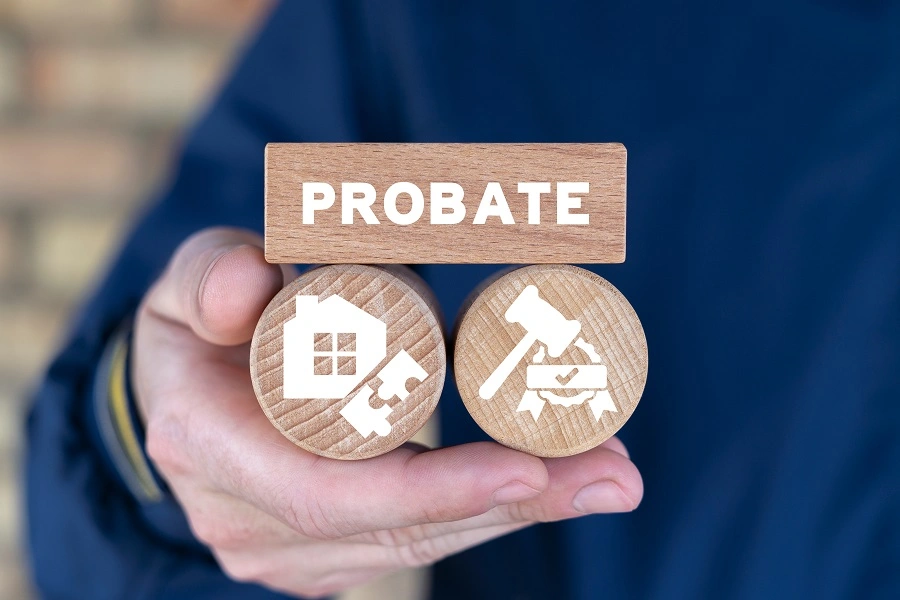The personal representative of an estate has a legal and ethical duty to carry out a loved one’s final wishes, but what happens when they abuse their power, delay distributions, or act dishonestly? If you suspect the personal representative has engaged in misconduct in Arizona, you’re not alone — and you don’t have to stand by helplessly.
Whether mismanaging assets, withholding information, or outright stealing from the estate, their actions can cause financial harm and emotional distress for beneficiaries. Our skilled and experienced probate attorney team in Arizona understands that the feeling of powerlessness while watching your assets dwindle can be overwhelming. Fortunately, Arizona law provides clear pathways to address representative misconduct when it occurs.
Red Flags of Personal Representative Misconduct

Under Arizona Revised Statutes §14-3703, personal representatives must fulfill their fiduciary duty by managing the estate with the same care they would use for their own assets. This means acting solely in the estate's interest, avoiding conflicts of interest, maintaining detailed records, and following the wishes outlined in the will. When a personal representative fails to uphold these responsibilities, they may be breaching their fiduciary duty under Arizona law.
When evaluating a personal representative’s performance, several red flags may indicate potential misconduct:
- Unreasonable delays in estate administration
- Failure to communicate with beneficiaries
- Improper distribution of assets
- Missing assets
- Charging excessive fees
Recognizing these warning signs early allows beneficiaries to take prompt action before estate assets are depleted or mismanaged beyond recovery. Arizona law provides specific protections against each of these forms of misconduct.
Legally Actionable Misconduct
Arizona law imposes clear fiduciary duties on representatives, requiring them to act with honesty and in the best interests of the estate and beneficiaries. Identifying what qualifies as misconduct is the first step in addressing concerns:
- Misappropriation of estate assets
- Failure to pay debts and taxes
- Breach of fiduciary duty (self-dealing, favoritism)
- Falsification of estate records
If proven, these violations are grounds for legal action in probate court. Once misconduct is substantiated with clear and convincing evidence, beneficiaries or other interested parties can petition the court for remedies. In severe cases, proven misconduct may also lead to personal liability for the personal representative, including civil judgments or even criminal charges if fraud or theft is involved.
Personal Representative Powers in Arizona Probate

Representatives in Arizona have substantial powers granted by both state law and the will document itself. Still, these powers come with strict limitations designed to protect beneficiaries and the testator's intentions.
Under Arizona law, personal representatives can take possession of estate assets, pay valid debts, file tax returns, defend the estate against claims, and distribute property according to the will. These powers enable them to fulfill their responsibilities efficiently, but always with full awareness that they serve the estate's best interests — not their own.
- Collect and inventory all estate assets.
- Manage and protect property during probate.
- Pay legitimate debts and taxes.
- Defend against invalid creditor claims.
- Distribute remaining assets according to the will.
- Sell property when necessary to pay debts or facilitate distribution.
- Fill out and file the proper forms and paperwork in court.
- Represent the estate in legal matters.
Key Limitations on Personal Representative Authority
Despite these broad powers, Arizona probate law establishes important boundaries on representative actions.
- Prohibition against self-dealing: Personal representatives cannot engage in transactions that create conflicts between their fiduciary obligations and personal interests. This includes buying estate property, lending estate money to themselves, or making investments that personally benefit them.
- Requirements for impartiality: A personal representative must treat all beneficiaries fairly according to the terms of the will. Showing favoritism, even when the representative is also a beneficiary, violates this fundamental obligation and may constitute grounds for removal.
- Following the will's terms: The will serves as the representative’s primary guide. When representatives disregard the deceased person's wishes as expressed in the will, they fail in their most basic duty. Arizona courts take this responsibility seriously.
- Keeping beneficiaries informed: Arizona law requires personal representatives to communicate with beneficiaries and interested parties. This includes providing timely information about the estate's administration and any significant developments that affect beneficiaries' interests.
- Filing required court documents: The probate court maintains oversight through required filings. A representative must submit detailed inventories, regular accountings, and final reports as required by Arizona statutes. Failing to fulfill these obligations can trigger court intervention.
Recognizing these boundaries helps beneficiaries determine when a personal representative has exceeded their authority. Any action beyond these limitations may constitute grounds for representative removal under Arizona probate law.
How to Document Personal Representative Misconduct
When you suspect misconduct, document specific incidents rather than general complaints. Note the date, action taken, who was involved, and how it violates the representative’s duties. Keep communications professional and in writing whenever possible.

Track any unusual financial transactions, unexplained asset disappearances, or dramatic changes in estate value. Request explanations in writing and save all responses. This documentation creates a timeline of potentially problematic behavior that can help establish a pattern of misconduct rather than isolated mistakes.
Building a strong case requires collecting specific documentation demonstrating the personal representative’s failures. Here’s what we suggest collecting:
- Estate inventories and valuations (initial and any updates)
- Bank and financial statements showing all transactions
- Representative communications, especially those refusing information requests
- Estate expense records and receipts
- Minutes from any meetings with the personal representative
- Copies of the will and any amendments
- Previous accountings filed with the court
In Arizona, beneficiaries have the right to request information about the estate under A.R.S. §14-3705. Make formal requests in writing, keeping copies of each communication. If the representative refuses to provide documents, this refusal can become evidence of misconduct to present to the court.
Tip: Consider sending document requests via certified mail with return receipt requested to create clear proof of your efforts to obtain information.
Thorough documentation is often the difference between successful and unsuccessful petitions for representative removal. Arizona courts respond to clear evidence rather than vague accusations or family disagreements.
Step-by-Step Instructions on How to Prove Representative Misconduct

Confronting potential personal representative wrongdoing requires methodical action and thorough preparation. Building a solid case means collecting specific evidence, observing patterns, and presenting your concerns through proper channels.
Here's a practical approach to document and address problematic representative behavior:
1. Monitor Representative Behavior Early in the Probate Process
Pay attention to communication patterns, delays, and how the personal representative responds to reasonable requests. Keep copies of all correspondence, noting any refusals to provide information or evasive answers. Watch for preferential treatment of certain beneficiaries, unusual asset transfers, or prolonged administration without clear justification.
2. Gather Concrete Evidence of Misconduct
Start by collecting all financial records, including bank statements, investment accounts, property transactions, and expense receipts. Request copies of estate inventories and compare them with your own knowledge of assets. Document any unexplained discrepancies, missing items, or questionable expenses in a detailed log with dates and specific details.
3. Request a Formal Accounting (If Appropriate)
As a beneficiary, you have the right to request a detailed accounting of all estate transactions. This formal document shows income, expenses, asset sales, and distributions, potentially revealing improper activities. Many representative problems become immediately apparent once financial details are properly disclosed.
4. Consult with a Probate Attorney
Consult with our experienced Arizona probate attorneys to evaluate your evidence and determine if it constitutes actionable misconduct. Our skilled lawyers have decades of combined experience and can help frame your concerns within relevant Arizona statutes and prepare properly formatted court documents. We can also advise on whether an informal resolution might be possible before pursuing court intervention.
5. File a Formal Petition in Arizona Probate Court
File a formal petition with the appropriate Arizona probate court, carefully following filing requirements and procedures. Include all supporting documentation, organized chronologically, with clear explanations of how each piece of evidence demonstrates a specific violation of fiduciary duty.
How to Know If You Need Legal Representation
Challenging a personal representative requires mastering intricate probate laws and court procedures, often against someone who may have access to estate funds for their defense. Professional legal guidance can be invaluable in these situations.
An experienced probate attorney can help you:
- Evaluate the strength of your case before filing
- Properly document and present evidence of misconduct
- Guide you through procedural requirements and deadlines
- Represent your interests at hearings
- Negotiate with the representative’s counsel when appropriate
- Identify additional legal options you may not be aware of
Having skilled legal representation often makes the difference between successful and unsuccessful removal petitions. Courts tend to give more weight to properly presented legal arguments supported by relevant case law and statutory references.
Preventative Measures: Avoiding Personal Representative Issues Before They Begin
While addressing representative misconduct is important, preventing these issues through proper estate planning is even more valuable. Arizona law offers several preventative options.
- Selecting a trustworthy representative: Choose someone with integrity, financial responsibility, and organizational skills. The ideal personal representative should be impartial and willing to communicate clearly with all beneficiaries, even during potentially emotional situations.
- Considering professional representatives: For larger or more intricate estates, bank trust departments or professional fiduciaries offer expertise and neutrality. Though they charge fees, their professional management often prevents the conflicts and mistakes that lead to misconduct claims.
- Appointing co-representatives: This creates a natural system of checks and balances, as each personal representative can monitor the other's actions. Consider pairing a family member who knows your wishes with a financial professional who brings technical expertise to the role.
- Building accountability measures: Include specific requirements in your will, such as regular reporting to beneficiaries or professional accounting reviews. You can also require court approval for certain transactions, creating additional oversight of the personal representative’s actions.
- Providing clear instructions: Leave detailed guidance about your wishes, especially regarding valuable or sentimental items. Specific instructions reduce a representative’s discretion and minimize opportunities for questionable decisions that might spark conflict.
Thoughtful estate planning remains the best defense against personal representative misconduct. By incorporating these preventative measures, Arizona residents can significantly reduce the likelihood of problems arising during probate — whether here or in other states with distinct legal requirements, such as Montana probate law.
Your Rights as a Beneficiary in Arizona
Arizona law provides beneficiaries with specific rights to protect their interests during probate. Familiarity with these rights is essential for holding personal representatives accountable.
In Arizona, beneficiaries, creditors, and other interested parties can hold a representative accountable by exercising these legal rights. The probate court maintains ultimate oversight and can intervene when presented with evidence of personal representative misconduct.
Actively exercising these rights often prevents minor issues from developing into serious misconduct. Arizona law empowers beneficiaries to participate meaningfully in the probate process rather than being passive observers.
Protect Your Inheritance: Next Steps
Taking action against personal representative misconduct requires knowing your rights, gathering proper evidence, and following Arizona's specific legal procedures. Prompt, documented intervention protects estate assets and honors the deceased's wishes as intended.
At HagEstad Law Group, our Arizona probate attorneys can advise and guide beneficiaries through the process of addressing representative misconduct. Whether you’re in Phoenix, Tucson, or anywhere in Arizona, contact us to help you evaluate your situation and determine the most appropriate legal response to protect your inheritance rights.

Get Skilled Help with Probate Disputes
You don’t have to face representative problems alone. Our Arizona estate attorneys are well-versed in local courts and probate procedures.





